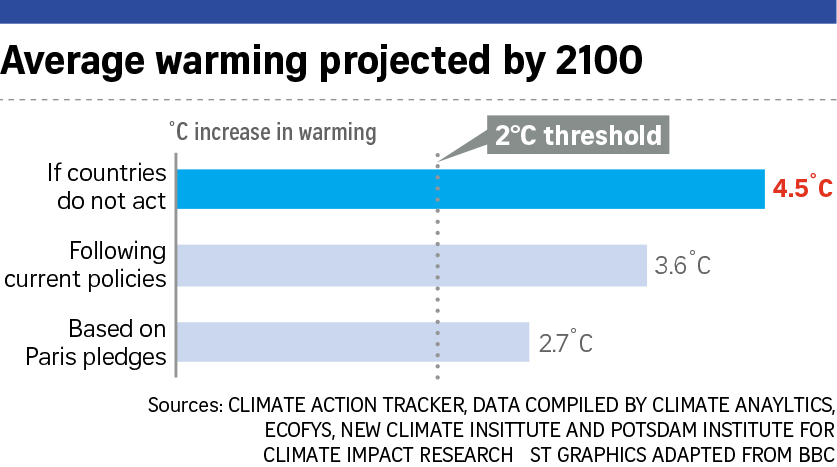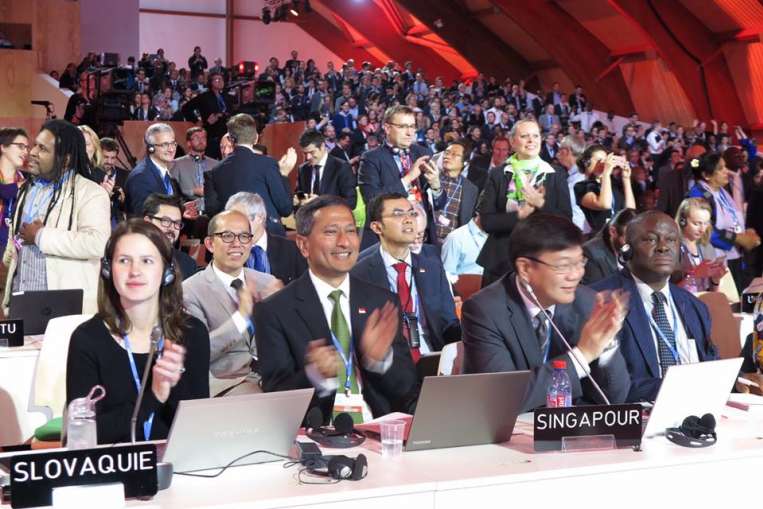Minister of Foreign Affairs and head of the Singapore delegation, Dr. Vivian Balakrishnan, told the final plenary session that Singapore was proud to be part of a major global agreement in which all nations will play a part in limiting the pace of climate change.
"It is not often in the lives of politicians, diplomats or [members of] civil society to be present at the genesis of a major earth-changing moment, and we have been blessed to be here, in Paris on the 12th of December 2015," he told hundreds of delegates at the end of the landmark conference.
He acknowledged the agreement, reached after two weeks of intense negotiations, was not perfect but for the first time the world had a climate pact in which all nations participated in cutting planet-warming emissions, with their actions open to scrutiny and, crucially, strengthened over time.
"We don't have a perfect agreement but we have a good and necessary agreement. This historic agreement sets us on a collective journey for climate safety," he said, adding the pact's inclusive nature, while respecting individual national differences, was vital.
"Singapore has always emphasized the need for a comprehensive, rules-based, legally binding agreement applicable to all. Without universal participation, we will fail the future generations," he said.
Singapore has played an outsized role during the talks in Paris and in the months leading up to the meeting.
Dr. Balakrishnan was a co-facilitator appointed by the French government, as host of the talks, to try to find resolutions on the issue of differentiation. This involves the different roles and responsibilities of rich and poor nations and it has proved a deeply divisive issue during years of UN climate talks.

In the end, developed and developing countries felt the final text reflected the balanced needs, roles and abilities of poorer nations on finance, transparency of national actions, reporting and review as well as the aim for all nations to limit warming to well below 2 degrees Celsius and to pursue efforts to cap warming at 1.5 degrees Celsius above pre-industrial levels.
Singapore also played a key role in facilitating discussions on transparency of national actions, with Climate Change Ambassador Mr. Kwok Fook Seng refining the text for the article on transparency in the final agreement.
"I believe the current agreement strikes the right balance between the developed countries and the developing parties, the right balance between mitigation and adaptation, the right balance between means of implementation and ambition," Dr. Balakrishnan said.
He also thanked delegates for taking into account the special circumstances of the most vulnerable low-lying island states. Singapore is part of the 44-member Alliance of Small Island States (AOSIS). "The commitment to hold the 'increase in the global average temperature to well below 2 degrees Celsius and to 'pursue efforts to limit the temperature increase to 1.5 degrees Celsius will give us, all the islands, some reassurance."
During a doorstop late on Saturday, Dr. Balakrishnan said it was too early to say if Singapore would need to increase its ambition on emissions reductions. Singapore, which is heavily reliant on fossil fuels for its energy and has large petrochemical, shipping and aviation industries, has pledged to reduce its emissions intensity by 36 per cent from 2005 levels by 2030, and stabilize its emissions with the aim of peaking around 2030.
The minister said it was important to see what everyone else did and to look at the scientific evidence on whether the world was on the right path to prevent catastrophic climate change.
"Over the next few years as the evidence accumulates and science indicates whether we are doing enough -- probably not -- in which case we will have to see at a global level how much needs to be done and can be done," he said.
"So the point is we shouldn't prematurely jump the gun but the trajectory and the framework, the system has now been created for the world to be able to take collective action."
Source: Straits Times | 13 December 2015














